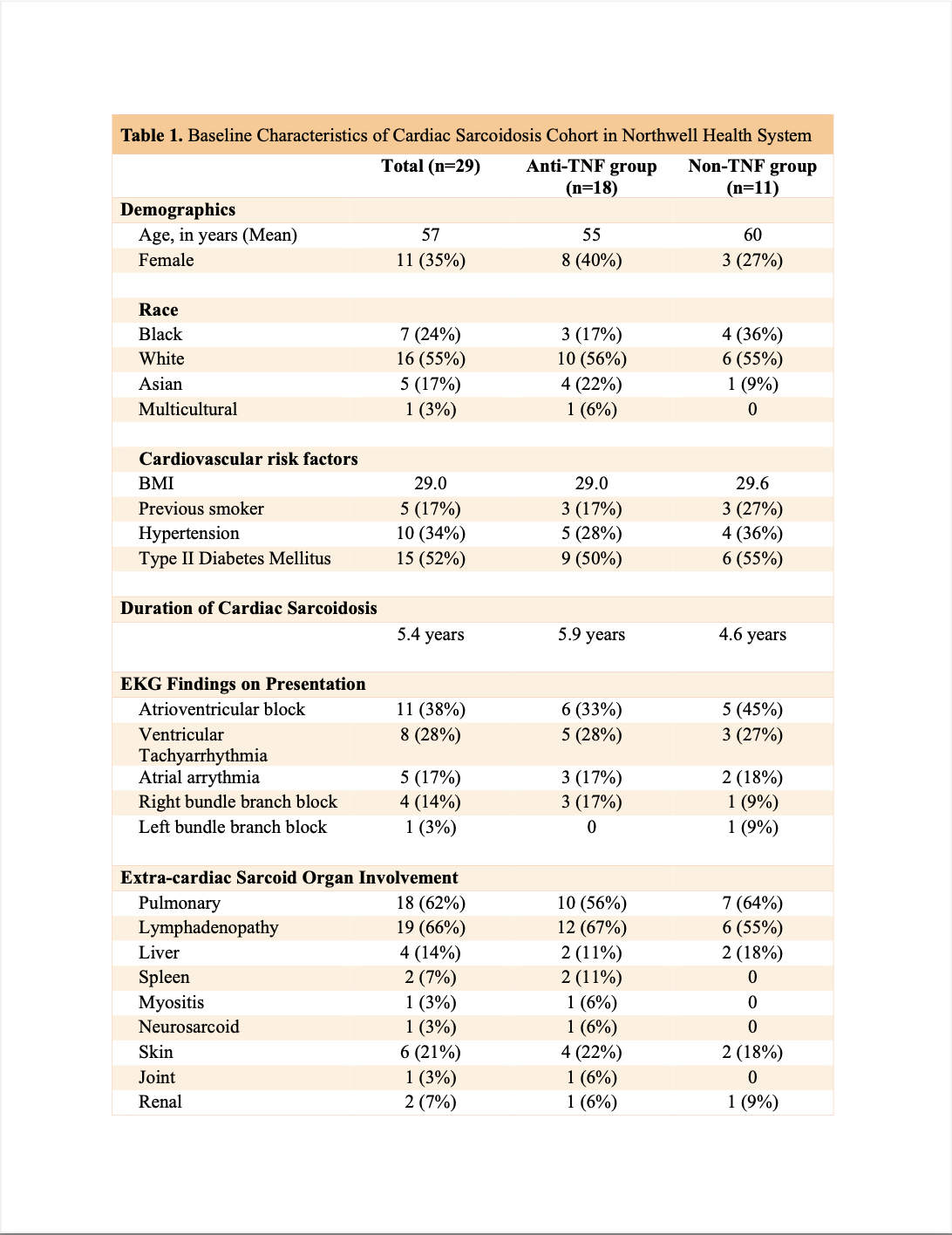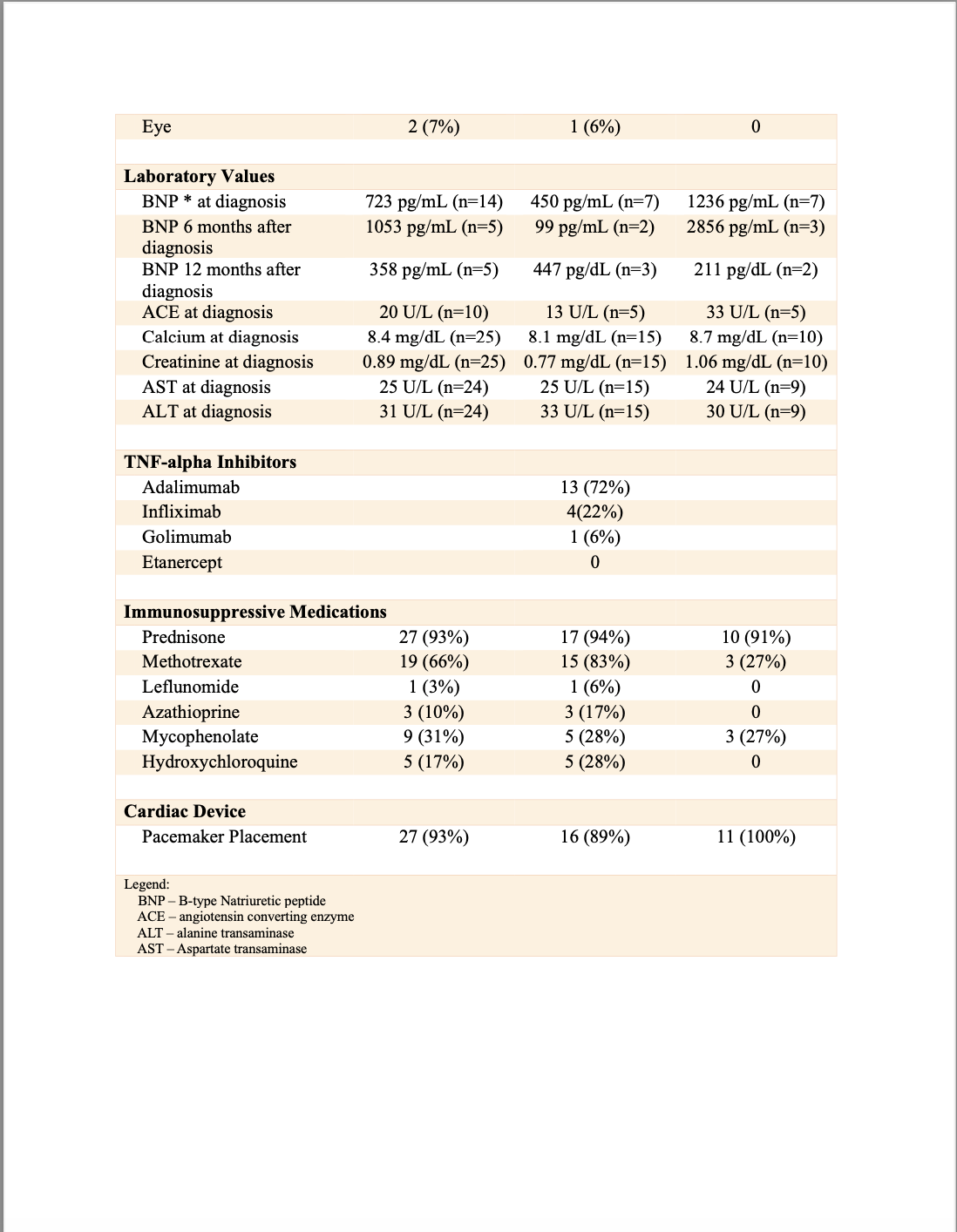Session Information
Date: Monday, November 13, 2023
Title: (1124–1154) Miscellaneous Rheumatic & Inflammatory Diseases Poster II
Session Type: Poster Session B
Session Time: 9:00AM-11:00AM
Background/Purpose: Cardiac sarcoidosis is one of the most common causes of mortality from sarcoidosis. In this retrospective study, we describe prescribing patterns and compare outcomes between patients treated with conventional immunosuppressive therapies (IS), and tumor necrosis factor-α inhibitors (anti-TNF) therapy.
Methods: This is a retrospective analysis of cardiac sarcoidosis patients evaluated at Northwell Health Rheumatology. Diagnosis was validated by manual chart review. Clinical characteristics, echocardiogram (ECHO) and PET CT results were collected at baseline and yearly. EF was derived from ECHO and PET CT. Annualized relative percent change of EF from baseline to final year was calculated based on PET EF, or ECHO EF. Correlation between PET CT EF and ECHO EF with R = 0.56 permitted us to use ECHO as substitution when PET CT was not available. Definition of improvement (DOI) was defined as improvement of EF by > 10%, by PET CT or ECHO no new FDG uptake, and decreased standardized uptake value (SUV) when available on PET. Definition of worsening (DOW) was defined as decline in EF by > 10% on PET CT or ECHO, new or worsening of FDG uptake, and increased SUV on PET. Descriptive statistics, T-tests, ANOVA tests, Fisher’s exact and Spearman’s correlation tests were used for statistical analysis.
Results: Baseline demographic and clinical characteristics of the 29 patients that met inclusion criteria are outlined in Table 1. Twenty-two patients had at least two PET/ECHO data for analysis, of whom 15 received anti-TNF. Duration of follow up was 1-3 years. Majority of patients had 2 years of follow up (11/22 patients). Four of 22 patients met DOI, and 3 of those patients had received anti-TNF (p = 0.99). 2 patients met DOW, of whom one received anti-TNF.
There was no difference in baseline EF between the two groups (p= 0.88). EF did not change from baseline to year 1 in both anti-TNF group (p = 0.2) and non-TNF group (p = 0.71). Statistically significant improvement of EF was observed at year 2 in the anti-TNF group as compared to baseline (mean EF: 46.8% vs. 51.2%, p=0.03) and the trend of improvement continued to year 3 (mean EF: 44.0% vs. 52.0%, p=0.05). The non-TNF group had improvement in mean EF, but it was not statistically significant (41.7% vs 55.0%, p = 0.30) likely due to a small sample size. No statistically significant change was seen by calculating annualized relative EF change (Mean = 4.1, SD 11.89) in the anti-TNF group as compared to the non-TNF group (Mean = – 0.7, SD 29.38).
Conclusion: We describe clinical characteristics and prescribing patterns of cardiac sarcoidosis cohort across Northwell Health System. Interestingly, the average baseline B-type Natriuretic Peptide of patients treated with anti-TNF was lower than patients treated with conventional IS, likely due to avoidance of anti-TNF in decompensated heart failure. No significant change was seen in EF after a year, irrespective of the treatment choice. By year 2, improvement of EF was seen in the anti-TNF group and the trend continued to year 3. Further analysis is planned to compare clinical outcomes of cardiac sarcoidosis patients treated with anti-TNF versus conventional IS.
To cite this abstract in AMA style:
Kwon A, Liu A, Narain S, Katzap E, Marder G. The Prescribing Patterns and Role of TNF-α Inhibitors in Treatment of Cardiac Sarcoidosis Patients [abstract]. Arthritis Rheumatol. 2023; 75 (suppl 9). https://acrabstracts.org/abstract/the-prescribing-patterns-and-role-of-tnf-%ce%b1-inhibitors-in-treatment-of-cardiac-sarcoidosis-patients/. Accessed .« Back to ACR Convergence 2023
ACR Meeting Abstracts - https://acrabstracts.org/abstract/the-prescribing-patterns-and-role-of-tnf-%ce%b1-inhibitors-in-treatment-of-cardiac-sarcoidosis-patients/


